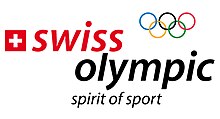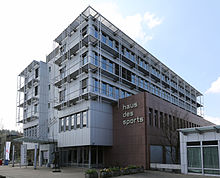Swiss Olympic
| Swiss Olympic | |
|---|---|
| Founded | 1997 |
| Place of foundation | Ittigen |
| president | Jürg Stahl |
| societies | 19,500 |
| Members | approx. 2 million |
| Homepage | www.swissolympic.ch |
Swiss Olympic (also Swiss Olympic Association, Association Olympique Suisse and Associazione Olimpica Svizzera ) is the National Olympic Committee and the umbrella organization for organized Swiss sport under private law with 104 members (81 national sports associations and 23 partner organizations), to which around two million athletes participate in around 19,500 associations belong to. Swiss Olympic is based in the House of Sports in Ittigen near Bern . Swiss Olympic represents Olympic and non-Olympic sports and is a non-profit organization. The major sports associations are divided into regional and cantonal associations.
history
The Swiss Olympic Movement has been supported by the Swiss Olympic Association (Swiss Olympic) since January 1, 1997 (called the Swiss Olympic Association until 2001). Swiss Olympic emerged from the union of the Swiss National Sports Association (SLS) and the Swiss Olympic Committee (SOC). The National Committee for Elite Sport (NKES) was integrated into the organization when it was founded. The SOC was founded in 1912 and accepted by the International Olympic Committee (IOC) in the same year . Before that there were no official Swiss delegations to the Olympic Games . However, time and again individual athletes took part independently. One example is the gymnast Louis Zutter, who was the only Swiss citizen to take part in the Olympic Games in 1896 . So far, two Winter Olympic Games have been held in Switzerland. In 1928 and 1948 the Winter Olympics took place in St. Moritz.
organization
Swiss Olympic is an association and umbrella organization of 81 Swiss sports associations. The so-called sports parliament, the assembly of the member associations at which they are entitled to vote according to their size, acts as the highest body. An executive council, consisting of the President, the Vice-President, 14 other members and the Swiss members of the IOC, is the governing body of the umbrella organization and represents Swiss Olympic externally. An office is responsible for administration. In addition, the disciplinary chamber for doping cases and the athletes commission are connected to Swiss Olympic.
Goals and Strategy
Four key objectives:
Swiss Olympic defines its goals as follows:
- supports and strengthens the member associations and thus Swiss sport in all its facets
- spreads and anchors the Olympic values (high performance, respect, friendship) in society, especially in schools
- creates the best possible conditions for achieving sporting success on an international level
- represents the interests of the private sector in Swiss sport and advocates its social recognition
Olympic missions
Swiss Olympic is responsible for various Olympic missions and their delegations. In addition to the Summer and Winter Olympic Games , Swiss Olympic sends delegations to the Youth Olympic Games , the European Games , the European Youth Olympic Festival and the ANOC World Beach Games. In addition, Swiss Olympic organizes the Tenero Talent Meeting (3T) twice a year. Swiss Olympic defines the corresponding selection criteria together with the responsible associations for the individual major sporting events and then selects the qualified athletes in the further process. In order to be able to offer the athletes the best possible environment at the competition site, Swiss Olympic takes care of all organizational matters in advance. Accommodation and the required training infrastructure at the venue are organized and suitable flights are booked for the entire delegation.
Association funding
Swiss Olympic works specifically and individually with the individual associations in order to increase the chances for top performance at Olympic and Paralympic Games, World and European Championships, World Games or other competitions of the highest priority. The performance agreements between Swiss Olympic and the member associations are each concluded for a period of four years in order to increase planning security for the associations. The agreements stipulate which financial contributions and services Swiss Olympic provides for association management, ethics and competitive sport and which tasks the association performs in return. The different sports are classified from Group 1 to Group 5. Swiss Olympic uses this classification as a management tool to determine the scope of financial support. Those sports are taken into account whose associations are based on a specific competitive sports funding concept and which are geared towards successful participation in the Olympic Games, Paralympics and World and European Championships (including Universiade and World Games). The types of sport are assessed on the basis of the results achieved, the medium-term potential, the implementation of their funding concept and their national importance. In addition to financial aid, Swiss Olympic supports the associations with expertise in the areas of ethics, association planning, training and trainer education. In addition, the various Swiss Olympic Cards are given to the athletes and functionaries. Swiss Olympic also promotes professional training for athletes with various programs and certified medical institutions that are particularly geared towards top athletes.
Ethics Charter - Nine Principles for Swiss Sport
The Olympic values - high performance, friendship and respect - form the basis for fair and sustainable sport worldwide. The ethics charter of Swiss Olympic and the Federal Office for Sport (BASPO) builds on these values and aims to contribute to fair, non-discriminatory and fraud-free sport. The ethics charter is a mandatory part of the statutes of every member association of Swiss Olympic. The member associations are accordingly obliged to appoint an ethics officer who ensures that the charter is implemented within the sports association and who takes care of the association's ethical challenges. The Code of Conduct drawn up by Swiss Olympic and the various programs are important tools in this regard. They show how the Olympic values and the ethics charter are optimally applied in everyday life in the association and at sporting events.
Swiss Olympic Card
The Swiss Olympic Card is an award for athletes - on the one hand for internationally achieved competitive performance and on the other hand for existing potential. The Swiss Olympic Card is available in five different versions - depending on the level of performance. The award is made annually in consultation with the relevant member association. Depending on the variant, the card offers access to special services and discounts.
Web links
- Marie-Hélène Guex: Olympic Movement. In: Historical Lexicon of Switzerland .
- Swiss Olympic website
Individual evidence
- ↑ Jürg Stahl is the new President of Swiss Olympic. November 25, 2016, accessed August 10, 2018 .
- ↑ strategy. Retrieved August 20, 2020 .
- ↑ Olympic Movement. Retrieved August 20, 2020 .
- ↑ Swiss Olympic: Strategy. Swiss Olympic, accessed on August 20, 2020 (German).
- ↑ Olympic Missions. Retrieved August 20, 2020 .
- ↑ Association funding . Retrieved August 20, 2020 .
- ↑ Values & Ethics. Retrieved August 20, 2020 .
- ↑ Swiss Olympic Card. Retrieved August 20, 2020 .





